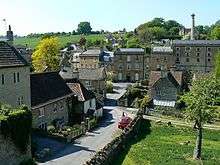Elizabeth Rebecca Ward
Elizabeth Rebecca Ward (2 December 1880 – 16 April 1978)[1] was a prolific English writer of popular verse, religious works, and works for children. She wrote under the pen-name Fay Inchfawn. Her works were serialised in women's magazines, and she was sometimes known as "The Poet Laureate of the Home".
.jpg)

Early life and family
Elizabeth Rebecca Ward was born Elizabeth Rebecca Daniels at Portishead, Somerset, on 2 December 1880.[2] She married Atkinson Ward (1882 – October 1965) in 1911 in the Long Ashton district of Somerset.[3] They moved to Bradford-on-Avon in Wiltshire and in 1913 had a daughter, Mary Arundell Ward (died 1983).[4] Mary was known as "Bunty" in Ward's books. In 1927, the family moved to Innisfree, a Victorian villa at Freshford, Somerset, where she lived for the rest of her life.[5]
Career
Writing as Fay Inchfawn,[6] Ward was a prolific author of books of popular verse during the years between the two World Wars. Her works were serialised in women's magazines and she was sometimes known as "The Poet Laureate of the Home".[7] She also wrote books for children, including with her husband under the pseudonym Philip Inchfawn, and numerous religious works.
Her Salute to the village (Lutterworth, 1943) was a first-hand account of the effects of the Second World War on a middle class provincial family with real locations and people disguised using pseudonyms. Although not identified in the book, the village is presumed to be Freshford. The book describes the influx of refugees from the bombing of nearby Bath in 1942 during the "Baedeker raids", shortages, the blackout, fire-watching, and the building of pill-boxes and barricades in the fields so that enemy gliders could not land. It was illustrated with line drawings by Alfred Bestall who also drew Rupert Bear for The Daily Express. The book was republished in 2010 by Folly Books with a new biographical introduction by Nick McCamley.[8]
Ward's memoirs were published by Lutterworth Press in 1963 as Those remembered days: A personal recording. This was followed by Something more to say: A personal recording in 1965 and Not the final word: Or, a joyful tribute in 1969.
Death
Ward died on 16 April 1978 and is buried at St Mary's, Limpley Stoke.[5] A celebration of her life was held at St Mary's on what would have been her 100th birthday, which was written up for This England magazine.[9]
Selected publications
- A book of remembrance. Ward Lock, London, c. 1930.
- As I lay thinking
- Father Neptune's treasure: The adventures of three children and a golliwog under the sea. S. W. Partridge & Co., London, 1919. (With Philip Inchfawn, pseud. Atkinson Ward)
- Having it out: Talks and readings for women's meetings
- Homely talks of a homely woman[10]
- Homely verses of a home-lover
- Little donkey
- Living in a village
- Not the final word: Or, a joyful tribute. Lutterworth Press, 1969. ISBN 0718816404
- Picnic on the hill
- Poems from a quiet room
- Salute to the village. Lutterworth, 1943. (Illustrated by Alfred Bestall) (Republished by Folly Books, 2010)[11]
- Senior reciter
- Something more to say: A personal recording. Lutterworth Press, 1965
- Songs of the ups; downs
- Sweet water and bitter
- The adventures of a homely woman
- The beautiful presence in the garden of the soul
- The day's journey
- The Golliwog news: A story of three children and a toy newspaper. S.W. Partridge & Co., London, 1913. (Illustrated by T.C. Smith) (With Philip Inchfawn, pseud. Atkinson Ward)
- The journal of a tent-dweller. Religious Tract Society, 1931
- The life book of Mary Watt. Ward Lock, London, 1935
- The little donkey
- The verse book of a homely woman, 1920.[12] Republished by Standard Publications, 2009.[13]
- Think of the lilies (Lakeland)
- Those remembered days: A personal recording. Lutterworth Press, 1963
- Through the windows of a little house (Republished by FB&C, 2017)[14]
- Unposted letters
- Verses of a house-mother[15]
- Who goes over the sea
- Who goes to the garden
- Who goes to the wood
- Will you come as well? Ward Lock, London, c. 1931. (Illustrated by Treyer Evans)
References
- "Fay Inchfawn". All Poetry. Retrieved 13 June 2017.
- England & Wales deaths 1837–2007 Transcription. Retrieved 30 January 2016. (subscription required)
- England & Wales marriages 1837–2008 Transcription. Retrieved 30 January 2016. (subscription required)
- England & Wales deaths 1837–2007 Transcription. Retrieved 30 January 2016. (subscription required)
- Salute to the Village. Folly Books, 2010. Retrieved 27 February 2016.
- Carty, T.J. (2015). A dictionary of literary pseudonyms in the English language (2nd ed.). New York & London: Routledge. p. 2044. ISBN 978-1-135-95585-4.
- Davidoff, Leonore. (1995). Worlds between: Historical perspectives on gender and class. New York: Routledge. p. 92. ISBN 978-0-415-91488-8.
- "Fay tells a lovely story", Nick McCamley, Western Daily Press, [Bristol, UK], 27 March 2010, p. 8. ProQuest. Retrieved 30 January 2016.
- "It was good to bring back memories of the 'delightful' Bath writer Fay Inchfawn: Letters Anonymous", The Bath Chronicle, Bath (UK), 22 April 2010. ProQuest. Retrieved 30 January 2016.
- Delap, Lucy. (2011). Knowing their place: Domestic service in twentieth-century Britain. Oxford: Oxford University Press. p. 181. ISBN 978-0-19-957294-6.
- Fay Inchfawn (2010). Salute to the Village. Folly Books. ISBN 978-0-9564405-0-1.
- Review, Times Literary Supplement, 9 December 1920.
- Elizabeth Rebecca Ward (December 2009). The Verse-Book of a Homely Woman. Standard Publications, Incorporated. ISBN 978-1-4385-3393-3.
- Fay Inchfawn (26 February 2017). Through the Windows of a Little House. Fb&c Limited. ISBN 978-0-243-51942-2.
- Fay Inchfawn. Verses of a house-mother ... The Religious Tract Society.